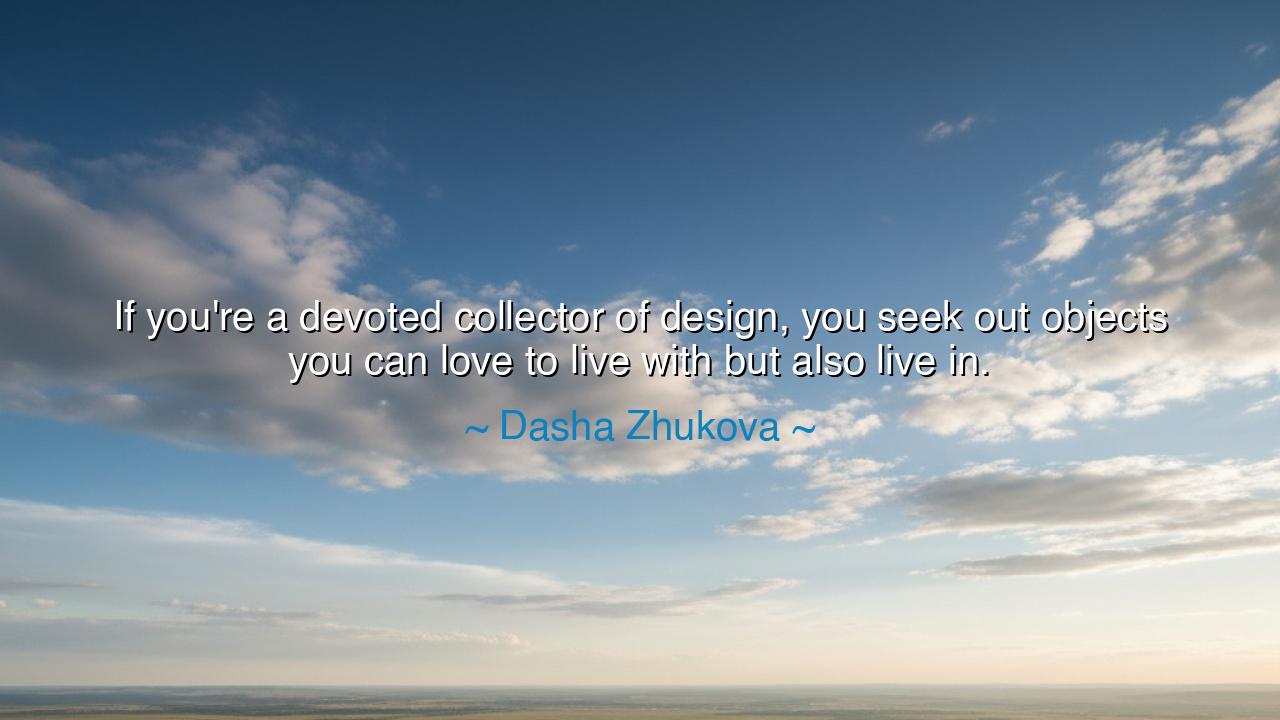
If you're a devoted collector of design, you seek out objects you
If you're a devoted collector of design, you seek out objects you can love to live with but also live in.






“If you’re a devoted collector of design, you seek out objects you can love to live with but also live in.” — Dasha Zhukova
In these gentle yet profound words, Dasha Zhukova, the visionary collector and cultural patron, speaks of a love that transcends possession — the sacred bond between art, life, and the human spirit. When she says one seeks “objects you can love to live with but also live in,” she is not merely describing a relationship with material beauty, but with meaning itself. She reminds us that the true collector, like the ancient philosopher or artist, does not gather things for vanity or display, but for communion — for the dialogue that occurs between the object and the soul that beholds it.
To live with an object, Zhukova suggests, is to share one’s days with it — to allow it to accompany you in the small rituals of existence, to let its beauty nourish the senses and shape the rhythm of your world. But to live in it — ah, that is something deeper. It is to inhabit the essence of the object’s design, to step into the harmony, craftsmanship, and thought that gave it life. It means allowing art to shape not only your surroundings, but your inner state — your way of perceiving, feeling, and even breathing. In this, Zhukova speaks to a truth that all creators and lovers of art have known: that beauty is not decoration, but habitation.
Dasha Zhukova’s life itself gives birth to this wisdom. As a collector, curator, and founder of contemporary art institutions such as the Garage Museum in Moscow, she has spent her years creating spaces where design becomes a living conversation. Her vision blurs the line between gallery and home, between the public and the personal. She embodies the ancient idea that aesthetics and existence are one — that to surround oneself with beauty is not indulgence, but a form of moral and emotional nourishment. The ancients believed that beauty brings order to the soul; Zhukova reminds us that when we live among thoughtfully designed things, we live closer to harmony itself.
The philosophers of old would have nodded in agreement. The Greeks, who worshiped form and proportion, believed that beauty was not a luxury but a pathway to virtue. Plato taught that through the contemplation of beautiful things, the human soul remembers the perfection from which it was born. And the Japanese masters of wabi-sabi found beauty in imperfection, in the texture of wood and the crack of pottery, for they understood that to live within art was to live within the flow of nature itself. These traditions, separated by centuries, converge in Zhukova’s sentiment: the objects that matter are those that reflect the human condition, that invite us to dwell in their quiet wisdom and to feel at home within their grace.
There is a story told of William Morris, the 19th-century artist and craftsman who led the Arts and Crafts Movement. He once said, “Have nothing in your house that you do not know to be useful, or believe to be beautiful.” Morris, like Zhukova, believed that every object we live with should elevate life rather than clutter it. He designed furniture, fabrics, and wallpapers not for palaces, but for the homes of common people, because he believed that good design could heal the spirit of an industrialized, weary world. His creations were not static things; they were vessels of intention, meant to be lived in, used, and loved — just as Zhukova speaks of.
Zhukova’s insight also speaks to the spiritual nature of collecting. To collect, when done with devotion, is not to hoard or to display power, but to curate a mirror of the soul. Every chosen object becomes a chapter in the story of the self — a record of what one values, what one aspires to, what one believes is beautiful or true. A devoted collector, then, is not merely a keeper of artifacts but a guardian of meaning. The home becomes a sanctuary where every chair, every sculpture, every painting whispers: You are part of a greater design.
Lesson:
From Dasha Zhukova’s words, we learn that design is not about possession, but about presence. The things we choose to surround ourselves with — whether humble or grand — should not only please the eye, but nourish the heart. Do not fill your home, or your life, with things that are hollow of meaning. Seek what you can live with — objects that comfort, inspire, and endure — and what you can live in — creations that invite you to dwell within their quiet strength and beauty. For in doing so, you will learn that the truest design is not the shape of the object, but the shape it gives to your living. And when art and life become one, you will no longer merely exist in your world — you will inhabit it with grace.






AAdministratorAdministrator
Welcome, honored guests. Please leave a comment, we will respond soon